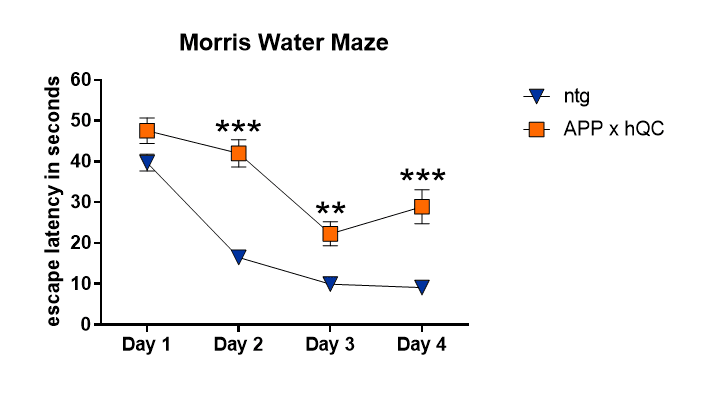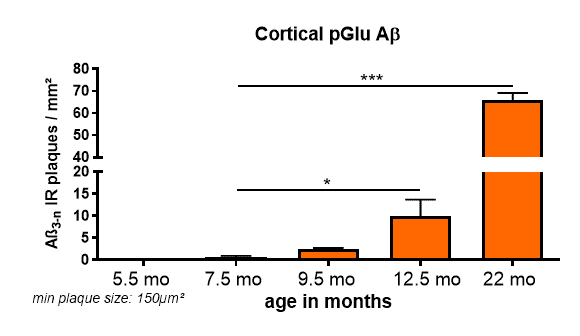APPSL x hQC mice are crossbreds of APPSL and hQC mice. Both transgenes are under the regulatory control of the Thy1 promoter and both mouse lines have a pure C57BL/6xDBA background.
The cross breeding of APPSL and hQC mice results in an increased generation of N-terminally modified pGlu Aβ peptides and allows the analysis of neurodegenerative events that depend on specific pGlu Aβ enzymatic activity. These mice are an efficient model to analyze pGlu Aβ modifying drugs in vivo. Additionally, transgenic APPSL x hQC mice present with the same pathologies as APPSL mice, but most symptoms appear a little earlier than in single transgenic APPSL mice. This model presents an unchanged motor performance.
APPSL x hQC mice are thus a good tool to study pGlu Aβ-dependent effects on cognition and histological parameters at an early age of 6 months. An additional readout of APPSL x hQC mice are hQC levels.
The most important characteristics of APPSL x hQC transgenic mice are:
- Increased Aβ plaque formation
- Increased neuroinflammation
- Cognitive deficits
Analysis of APPSL x hQC transgenic mice in the Morris water maze test showed a deficit in spatial learning and memory compared to non-transgenic littermates shown in Figure 1. Moreover, an increase in pGlu Aβ levels is observed in the cortex of APPSL x hQC mice as presented in Figure 2.

Figure 1: Morris water maze of 6 month old APPSL x hQC mice compared to non-transgenic littermates. Escape latency in seconds. Mean ± SEM. n = 4-8. Two-way ANOVA with Bonferroni’s post hoc test. **p<0.01; ***p<0.001.

Figure 2: pGluAβ levels in the cortex of APPSL x hQC mice over age. Aβ3 (pE)-40/42 quantification (>150 µm² plaque size) with an anti human pGlu Aβ antibody. Mean + SEM. One-way ANOVA. *p<0.05, ***p<0.001. n = 4 – 8.
QPS Neuropharmacology offers a custom-tailored study design for APPSL x hQC mice, and we are flexible to accommodate your special interests. We are also happy to advise you and propose study designs. APPSL mice show relevant features of AD already at 6 months of age. Based on various options to study APPSL x hQC mice, your study will be customized according to your requirements. Furthermore, wild type littermates are available as control animals needed for proper study design.
We are happy to evaluate the efficacy of your compound in the APPSL x hQC mouse model! The most common readouts are:
